You are viewing the Cultures of Knowledge Blog archive for the ‘Project Updates’ Category:
James Brown
October 12, 2010
Conferences and Workshops, Events, Project Updates
Tags: Communication, Encyclopaedism, Europe, History of Science, Jan Amos Comenius, John Aubrey, Millenarianism, Networks, Pansophia, Samuel Hartlib, Seventeenth Century, Universities
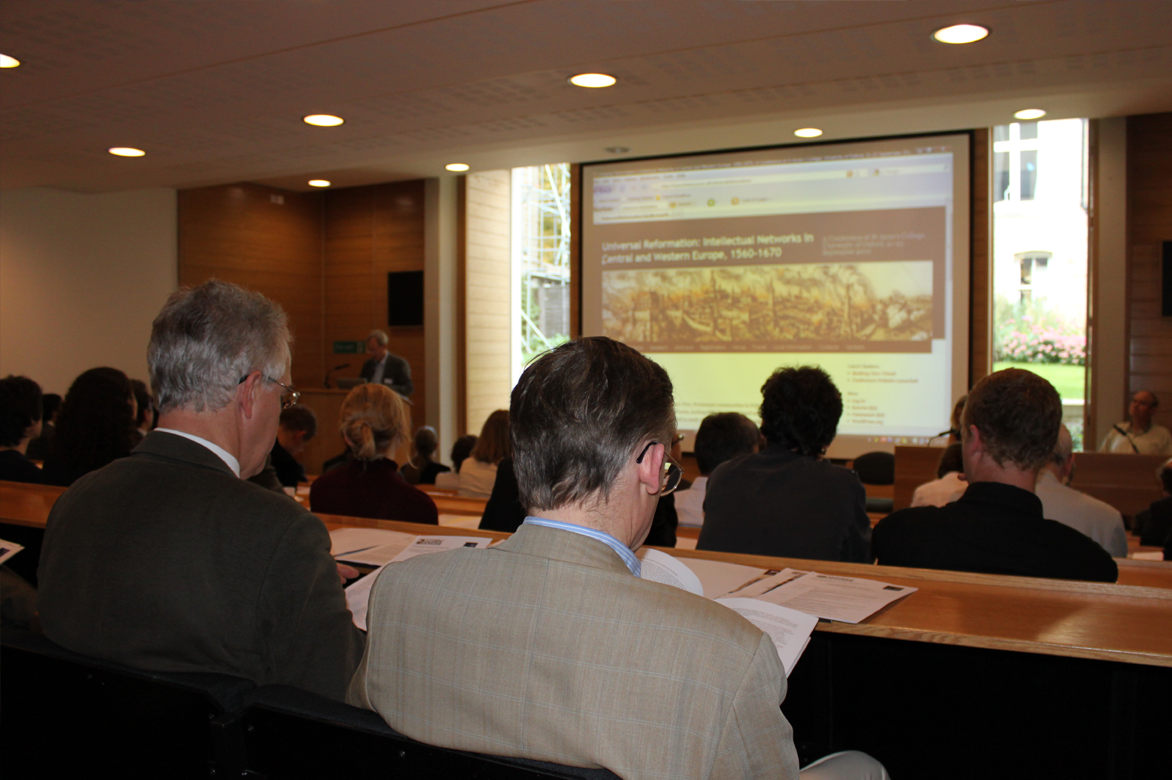
The opening plenary session.
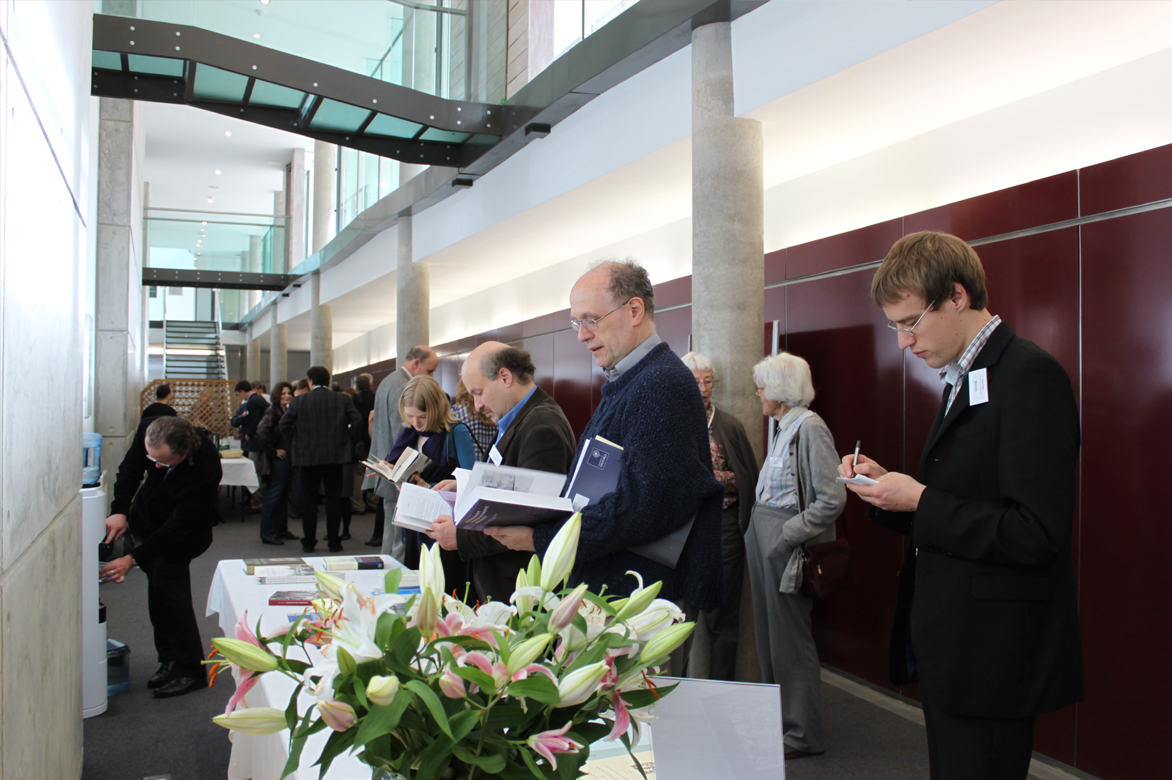
Relaxing in the foyer.
The Project’s inaugural conference, Universal Reformation: Intellectual Networks in Central and Western Europe, 1560-1670, took place at St Anne’s College on 21–23 September 2010. The event, which was attended by over ninety delegates, built on three preparatory European workshops (held in Prague, Cracow, and Budapest), and allowed forty-two emerging and established scholars from eleven countries to share their perspectives on the international networks and intellectual traditions brought into being by the upheavals of the Thirty Years War. Themes explored included institutional networks and intellectual exchange, encyclopaedia and pansophia, the early modern European media revolution, ecclesiastical reconciliation, and millenarianism, prophecy, and propaganda. Delegates also enjoyed a drinks reception in the Bodleian Library‘s historic Divinity School (incorporating a private viewing of the exhibition ‘My Wit was Always Working’: John Aubrey and the Development of Experimental Science), and were present for the prototype launch of our union catalogue. For further information, including speaker profiles and abstracts, please visit the conference microsite; for details of our 2011 event, please visit the conference webpage.
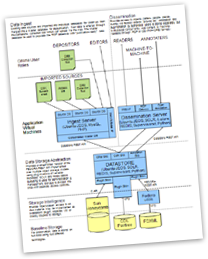 Neil Jefferies, who oversees the technical attributes of our union catalogue, will be presenting on the digital components of the Project next month at a conference entitled Digital Library: Digitising and Accessing Content (Slovakia, 22-24 September 2010). The event will bring together libraries from across Europe to share technologies, best practices, and emerging global standards in the field of large data sets and metadata preservation in the cultural and heritage sectors. Neil, who will also be delivering a keynote lecture at the conference, will be describing the catalogue’s innovative system architecture and its relationship to the Digital Asset Management System, which has been developed as a platform to support digital library projects within Oxford. Further details are available on the conference website.
Neil Jefferies, who oversees the technical attributes of our union catalogue, will be presenting on the digital components of the Project next month at a conference entitled Digital Library: Digitising and Accessing Content (Slovakia, 22-24 September 2010). The event will bring together libraries from across Europe to share technologies, best practices, and emerging global standards in the field of large data sets and metadata preservation in the cultural and heritage sectors. Neil, who will also be delivering a keynote lecture at the conference, will be describing the catalogue’s innovative system architecture and its relationship to the Digital Asset Management System, which has been developed as a platform to support digital library projects within Oxford. Further details are available on the conference website.
 We are currently seeking a Postdoctoral Fellow, fluent in both Czech and English, to work on the correspondence of the pioneering Moravian educational theorist Jan Amos Comenius (1592-1670). The successful candidate (who will be employed by and based at the Department for the Study and Editing of Comenius’s Work at the Institute of Philosophy of the Czech Academy of Sciences in Prague) will continue the compilation, translation, and correction of a database and digital archive of Comenius’s complete correspondence, which will form a central component of the Project’s union catalogue. The deadline for applications is noon on Wednesday 15 September 2010; further details and application instructions are available in English on our vacancies page and in Czech on the website of the Institute of Philosophy.
We are currently seeking a Postdoctoral Fellow, fluent in both Czech and English, to work on the correspondence of the pioneering Moravian educational theorist Jan Amos Comenius (1592-1670). The successful candidate (who will be employed by and based at the Department for the Study and Editing of Comenius’s Work at the Institute of Philosophy of the Czech Academy of Sciences in Prague) will continue the compilation, translation, and correction of a database and digital archive of Comenius’s complete correspondence, which will form a central component of the Project’s union catalogue. The deadline for applications is noon on Wednesday 15 September 2010; further details and application instructions are available in English on our vacancies page and in Czech on the website of the Institute of Philosophy.
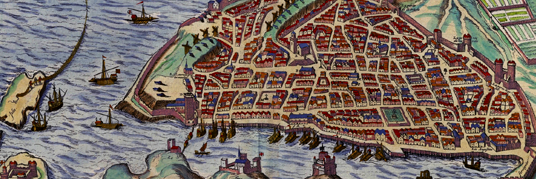
Marseille in 1575. View sourced from Historic Cities.
In the eighth and final installment of the Project’s inaugural seminar series on Wednesday 23 June, held in conjunction with the conference John Selden (1584–1654): Scholarship in Context, Professor Peter Miller (Bard Graduate Center) delivered a wide-ranging overview of ‘Peiresc’s Mediterranean Merchant Network’. Focusing on the letters sent by the polymath from Marseille in the early seventeenth century, Miller elaborated a fascinating story of ‘Peiresc and the sea’ in four parts (which focused respectively on Marseille, space and time in the Mediterranean, merchants, and names). The small, fast nature of Marseillaise ships, especially compared to Venetian craft, meant that letters dispatched from the French port arrived at their destinations quickly (reaching Leiden, for example in fifteen days), and Peiresc’s epistolary activities in the Mediterranean were reliant on an extensive maritime network of non-elite merchants, captains, and sailors, whose identities are in many cases painstakingly recorded (along with other names and biographies) in the letters themselves. This means that it is possible to reconstruct this particular correspondence ‘cloud’ (in Miller’s phrase) in particular detail, and during discussion he provided us with a tantalising glimpse into his forthcoming digitisation initiative which will both visualise Peiresc’s Mediterranean network and link it in an innovative way to an online monograph. For past lectures in the series, please see the seminar webpage; details of the 2011 series will be available shortly.
James Brown
July 16, 2010
Conferences and Workshops, Events, Project Updates
Tags: Communication, Encyclopaedism, Europe, Jan Amos Comenius, Networks, Pansophia, Politics, Religion, Samuel Hartlib, Seventeenth Century
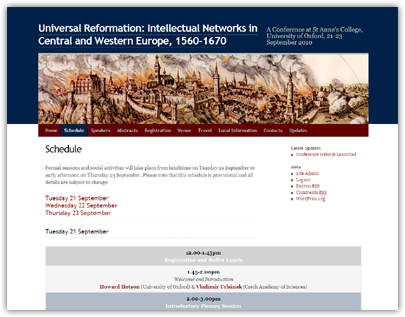 We are pleased to announce that booking is now open for ‘Universal Reformation: Intellectual Networks in Central and Western Europe, 1560-1670’, the first Project conference, which will take place at St Anne’s College, Oxford, on 21-23 September 2010. Organised by Howard Hotson and Vladimír Urbánek, the event will showcase the work of a diverse group of emerging and established scholars, many from east central Europe, who will converge on the intellectual networks and traditions engendered by the upheavals of the Thirty Years War. For provisional programme information, a steadily growing lists of speaker profiles and abstracts, and to book online, please see the new conference website. The deadline for registration is Friday 10 September.
We are pleased to announce that booking is now open for ‘Universal Reformation: Intellectual Networks in Central and Western Europe, 1560-1670’, the first Project conference, which will take place at St Anne’s College, Oxford, on 21-23 September 2010. Organised by Howard Hotson and Vladimír Urbánek, the event will showcase the work of a diverse group of emerging and established scholars, many from east central Europe, who will converge on the intellectual networks and traditions engendered by the upheavals of the Thirty Years War. For provisional programme information, a steadily growing lists of speaker profiles and abstracts, and to book online, please see the new conference website. The deadline for registration is Friday 10 September.
James Brown
July 14, 2010
Conferences and Workshops, Events, Project Updates
Tags: Communication, Databases, Digitization, Europe, History of Science, Networks, Royal Society, Samuel Hartlib, Seventeenth Century, Union Catalogue
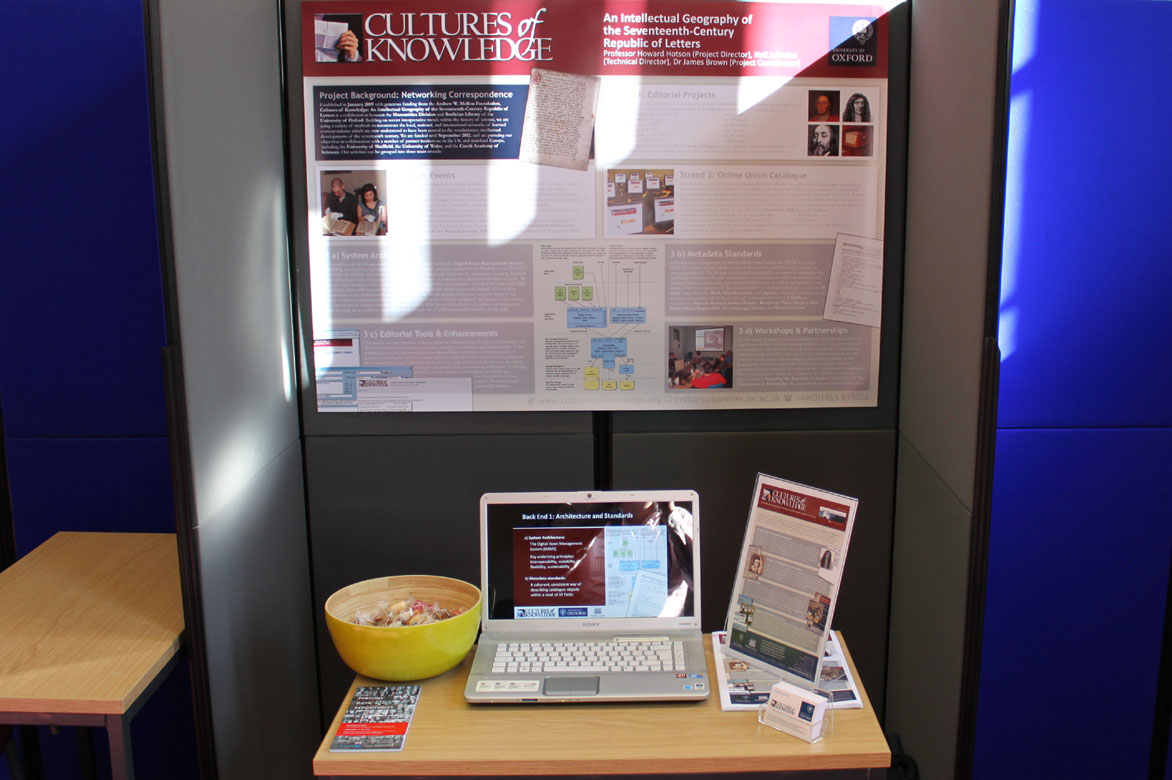
Our poster and stand at DH2010.
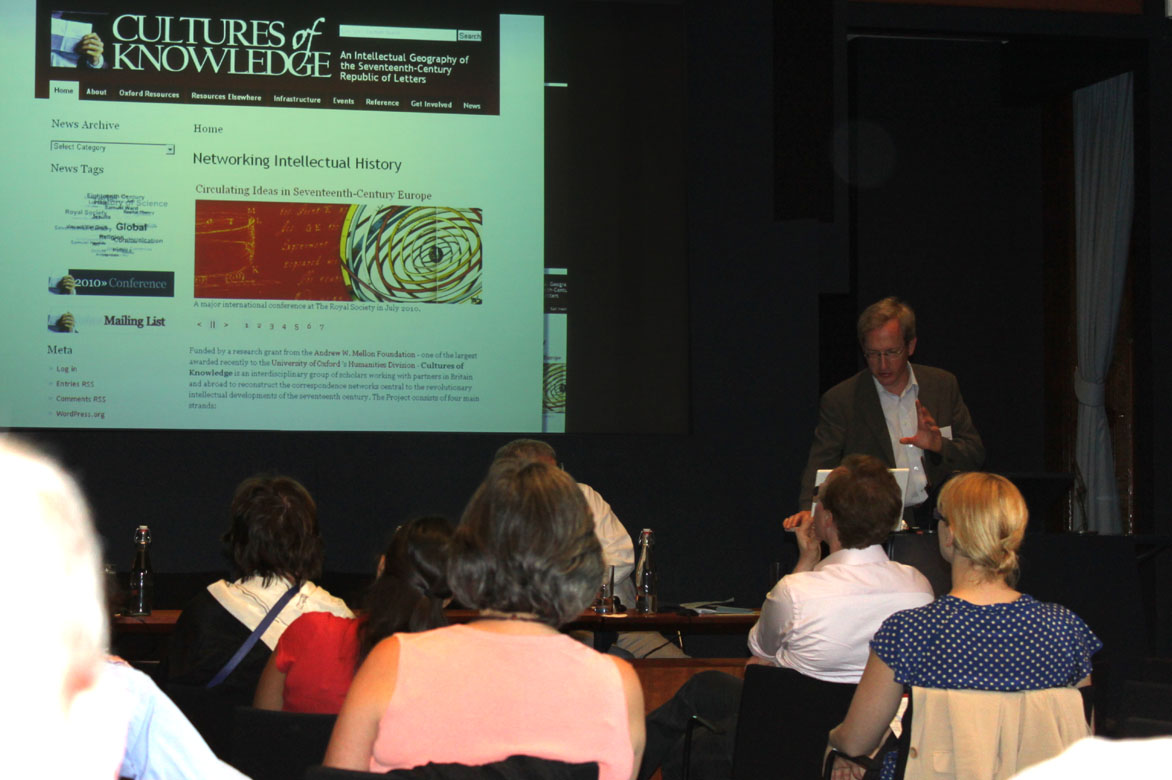
Presenting at the Royal Society.
Cultures of Knowledge headed to London last weekend as the Project Director and Coordinator braved thirty-degree metropolitan temperatures to share the Project’s research at two events. At Digital Humanities 2010, the flagship annual meeting of the digital humanities community hosted this year by King’s College London, we presented a poster, which focused mainly on our union catalogue and its technical underpinnings. We received very useful feedback and discovered and made connections with some highly complementary projects, including the initiative discussed below. Meanwhile, at the kind invitation of our collaborator Mark Greengrass, Howard Hotson co-delivered a keynote address at Circulating Ideas in Seventeenth-Century Europe: Networks, Knowledge, and Forms, a conference at the Royal Society organised by Ruth Connolly (University of Newcastle), Felicity Henderson (Royal Society), and Carol Pal (Bennington College). Building on Mark’s overview of Hartlib’s significance as an intelligencer and the trials and tribulations of the Hartlib Papers Project, Howard used a description of the place of Hartlib and his letters within Cultures of Knowledge as the basis for a more general overview of the Project and its aspirations, especially within the digital sphere.
Download the poster presented at DH2010




 We are currently seeking a Postdoctoral Fellow, fluent in both Czech and English, to work on the correspondence of the pioneering Moravian educational theorist
We are currently seeking a Postdoctoral Fellow, fluent in both Czech and English, to work on the correspondence of the pioneering Moravian educational theorist 




 Join
Join 